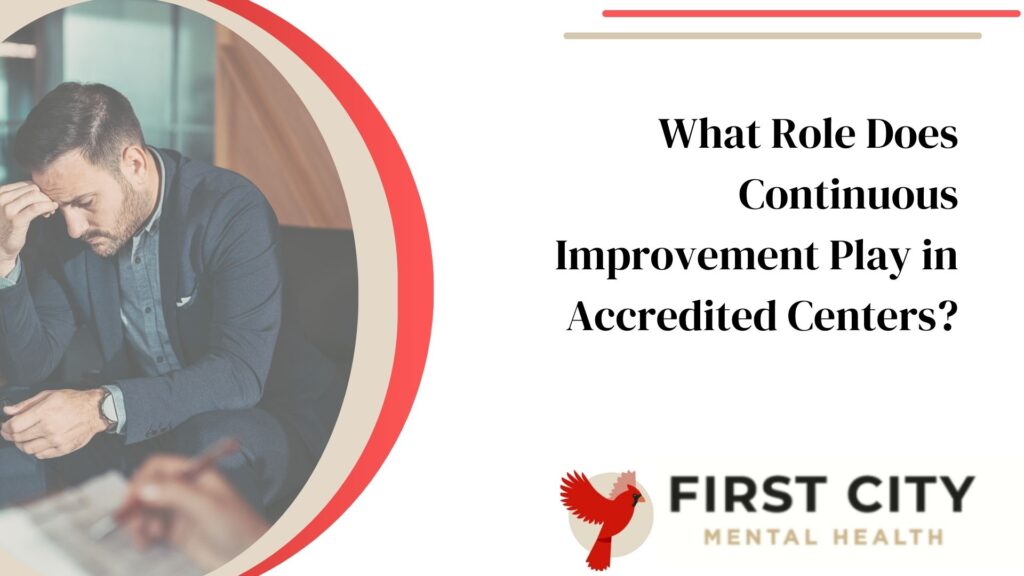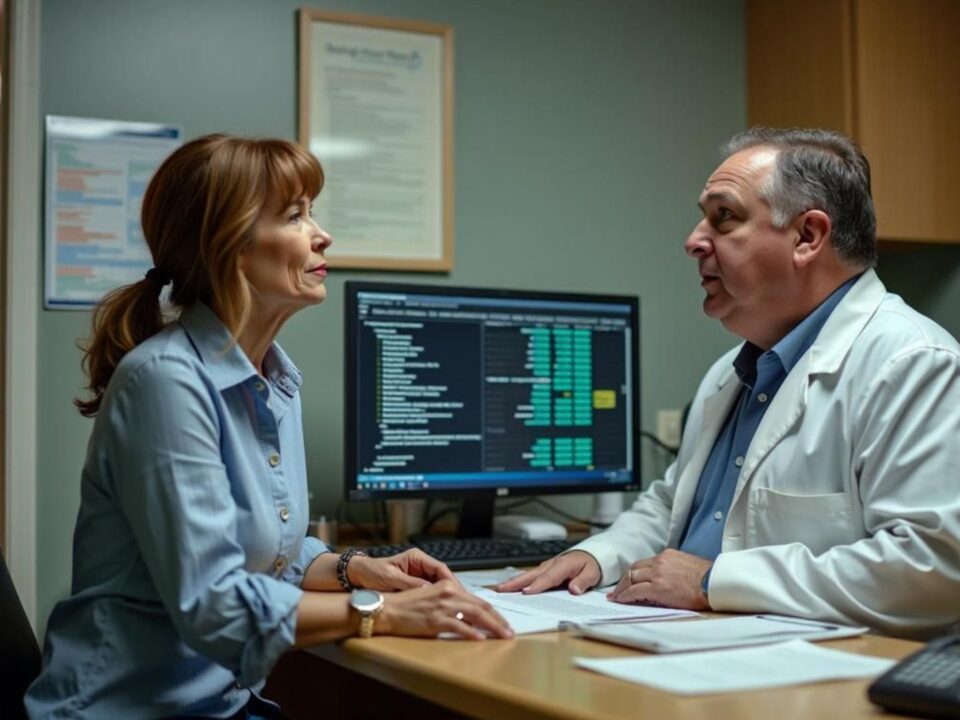
What Happens During Anxiety Disorder Treatment Sessions?
July 29, 2025
Why Choose a Mental Health Partial Hospitalization Program?
August 1, 2025Struggling with both mental health issues and substance abuse, often referred to as a co occurring disorder, can feel like an endless rollercoaster. You’re not alone—many people face the same challenge of finding effective co-occurring disorders treatment.
Choosing the right place for co-occurring disorders treatment help often makes a huge difference.
Accredited centers set the bar high in quality care. These centers adhere to rigorous standards, ensuring top-notch treatment approaches that work. In this article, you’ll learn why accredited choices offer better outcomes and safer environments for your recovery journey.
Ready to discover more? Keep reading!
Key Takeaways
- Accredited centers follow strict guidelines, which lead to better treatment outcomes. They use evidence-based practices that reduce relapse rates by 20%.
- Higher professional standards mean staff at accredited centers are well-trained and experienced. This ensures quality care with continuous training on the latest treatments.
- Continuous improvement is vital in these centers. Regular evaluations and audits help keep care up-to-date and effective for treating co-occurring disorders and mental health disorders.
- Patient safety is a top priority in accredited facilities. Strict protocols and regular inspections ensure a safe environment, reducing risks of errors during treatment.
- Follow-up and aftercare services from accredited centers support long-term recovery goals. Individualized plans include therapies like yoga or meditation, enhancing ongoing patient care.
What Accreditation Standards Ensure Quality in Treatment Centers for Substance Use Disorders?
Accreditation standards set clear guidelines for co-occurring disorders treatment at Kokomo Indiana Centers. These guidelines cover everything from staff qualifications to patient safety measures, ensuring comprehensive care for both substance use and mental disorder treatments. Accredited facilities in Kokomo, Indiana, must employ well-trained personnel and adhere to evidence-based practices.
This leads to better treatment outcomes.
Regular evaluations ensure these centers maintain quality care. For instance, continuous improvement is a pivotal part of the accreditation process. One case study showed that accredited centers reduced relapse rates by 20%.
Such rigorous oversight guarantees patients receive top-notch care with every visit. Choosing an accredited center isn’t just worthwhile; it’s essential for adequate recovery.
Why Accredited Co-occurring Disorders Treatment Centers Have Higher Professional Staff Standards

Accredited centers must meet strict criteria for staff qualifications. They demand higher levels of education, training, and experience from their team members, particularly in treating mental health disorder and substance use issues. This ensures patients receive care from highly qualified professionals.
Staff at these centers often hold advanced degrees in mental health fields. Regular ongoing training keeps them updated on the latest advancements in treatment for co-occurring disorders.
These centers also prioritize patient safety and well-being by maintaining rigorous professional standards. Their staff undergoes continuous professional development to stay informed about new evidence-based treatments for adult co occurring disorders treatment programs.
A multidisciplinary team approach means that each patient gets comprehensive care customized to their unique needs while focusing on integrated treatment for co-occurring disorders.
Let’s explore how accreditation influences evidence-based treatment approaches next!
How Accreditation Influences Evidence-Based Treatment Approaches for Co Occurring Disorders
Higher staff standards contribute to better treatment methods. Accredited centers stick to evidence-based approaches. They rely on scientific research and proven practices to address issues like drug abuse and co-occurring mental health conditions.
Patients benefit from integrated treatment for co-occurring disorders that are supported by evidence. These approaches lower the risk of relapse and improve recovery rates for co-occurring disorders treatment in Kokomo, Indiana.
Centers focused on evidence show higher levels of patient trust and satisfaction.
What Role Does Continuous Improvement Play in Accredited Centers?

Accredited centers constantly improve their treatment for co-occurring disorders methods, making them better at handling co-occurring mental disorders and substance use issues in places like Kokomo, Indiana. They update protocols and use the latest evidence-based practices.
Continuous improvement means individualized care for patients. “Ongoing efforts lead to personalized treatments,” says a center director. Staff training never stops, ensuring high-quality care is always provided.
Adaptability allows these centers to stay current with new mental health developments, enhancing patient outcomes in vital ways.
Why Patient Safety Is Enhanced at Accredited Treatment Facilities for Mental Health Disorders
Accredited centers adhere to higher patient safety standards and follow strict quality guidelines that reduce the risks of errors and complications. Experienced staff also play a massive role in ensuring safety, particularly for patients dealing with mental illness and substance use disorders.
Regular inspections ensure these facilities maintain high safety levels. Established emergency protocols also help keep patients safe during critical moments. These factors are crucial for co-occurring disorders treatment centers in Kokomo, Indiana.
How Regular Audits and Reviews Promote Better Outcomes in Accredited Centers
Regular audits and reviews boost safety in accredited centers. They ensure compliance with high care standards and hold everyone accountable. Patients benefit from better treatment because evaluations find areas for improvement.
Moreover, these assessments highlight evidence-based practices, keeping the staff well-trained and qualified. Thus, patient experiences improve significantly when centers undergo regular checks.
Trusting a center that conducts routine audits is crucial to effectively treat adult co-occurring disorders treatment.
Understanding Co-Occurring Disorders
Co-occurring disorders, also known as dual diagnosis, refer to the simultaneous presence of two or more mental health conditions or a combination of a mental health condition and a substance use disorder.
This can include various combinations such as anxiety, depression, post-traumatic stress disorder (PTSD), and substance use disorders. The complexity of co-occurring disorders requires specialized treatment approaches that address both aspects simultaneously to ensure effective recovery.
Definition and Prevalence
Co-occurring disorders are a significant issue affecting millions of individuals across the United States. According to the Substance Abuse and Mental Health Services Administration (SAMHSA), approximately 8.2 million adults experience co-occurring disorders each year.
This staggering number represents about 3.4% of the adult population, underscoring the critical need for specialized treatment centers that can address these complex conditions effectively.
Risk Factors and Causes
The development of co-occurring disorders can be attributed to a mix of genetic, environmental, and psychological factors. Some common risk factors include:
- Family History: A family history of mental health or substance use disorders can increase the likelihood of developing co-occurring disorders.
- Trauma or Stress: Experiencing trauma or high levels of stress can trigger or exacerbate mental health conditions and substance use disorders.
- Brain Chemistry Imbalances: Imbalances in brain chemistry can contribute to the development of both mental health and substance use disorders.
- Social and Environmental Factors: Factors such as poverty, lack of access to healthcare, and adverse living conditions can also play a significant role in the onset of co-occurring disorders.
Understanding these risk factors is crucial for recognizing the need for comprehensive treatment that addresses all underlying issues.
When Should Patients Opt for an Accredited Recovery Center?
Accredited centers have proven methods and standards. They offer patients the best in care. Here are specific times to opt for one:
- For comprehensive care of mental disorders like depression or anxiety.
- If treatment must follow high standards and use proven methods.
- When needing personalized options, including therapy and medication.
- For psychiatric services from skilled professionals for proper planning.
- In seeking a supportive environment with community connections through support groups.
- To aim for better overall well-being and daily functioning.
- When treating both mental health and substance use disorders over a longer period.
Choosing an accredited center ensures quality care and effective treatments, which is especially important for treatment for co occurring disorders in places like Kokomo, Indiana.
Why Accredited Centers Offer Better Follow-Up and Aftercare Services with Integrated Treatment

Accredited centers provide ongoing support after initial treatment of co-occurring disorders, boosting recovery outcomes. They offer high-quality follow-up services that help maintain progress and prevent relapse, especially for those with co-occurring mental disorders.
For people seeking co-occurring disorders treatment in Kokomo, Indiana, options, this consistent care is crucial.
They design individualized plans for each patient’s needs during follow-up and aftercare. These centers integrate various therapeutic modalities, including alternative therapies like yoga or meditation.
This comprehensive approach enriches the entire aftercare experience. Its elements ensure patients receive effective care throughout their recovery journey.
Final Thoughts
Choosing an accredited center can vastly improve co-occurring disorders treatment program outcomes for mental health disorders and substance use issues. High standards in staff training and evidence-based methods make a huge difference. Routine audits ensure constant quality and safety for patients.
Have you considered how this attention to detail benefits your recovery? Opting for accredited centers could be the best step toward lasting health and well-being.
FAQs
Why is it important to choose accredited centers for co-occurring disorders treatment?
Choosing accredited centers ensures a higher standard of care. These facilities have met rigorous criteria, often leading to better treatment outcomes for co-occurring disorders.
How do accredited centers improve the treatment of co-occurring disorders?
Accredited centers use evidence-based practices and have specialized staff trained in treating both mental health and substance use issues, including co-occurring mental disorders. This integrated approach can significantly enhance recovery rates.
Are there specific benefits of seeking treatment at an accredited center for co-occurring disorders?
Yes, patients receive comprehensive care tailored to their needs. Accredited centers provide structured programs that address all co-occurring disorders, leading to more effective management and long-term success.
Can non-accredited centers offer effective treatment for co-occurring disorders?
While some non-accredited centers may provide good care, they might lack standardized protocols or specialized training in accredited facilities. For the best chance at successful recovery, it’s wise to opt for an accredited center when dealing with complex issues like co-occurring disorders.






